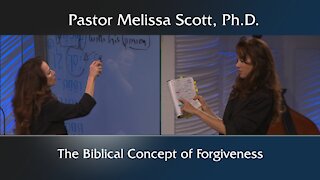Episode 1522: Do you really forgive?
Matthew 7:1-5 - Teaching on Judging Others: "Do not judge, or you too will be judged."
"Judge not, that you be not judged. For with what judgment you judge, you shall be judged: and with what measure you mete, it shall be measured to you again. And why do you see the mote that is in your brother's eye, and do not consider the beam that is in your own eye? Or how do you say to your brother: Let me cast the mote out of your eye; and behold a beam is in your own eye? Hypocrite, cast out first the beam in your own eye, and then shall you see to cast out the mote out of your brother's eye."
Matthew 7:1-5 is often understood to convey several important moral and spiritual lessons. Here is a traditional Catholic perspective on the meaning of this passage:
Do Not Judge Harshly: The opening verse, "Judge not, that you be not judged," is seen as a warning against harsh and unjust judgment of others. It emphasizes the importance of mercy, understanding, and forgiveness in our interactions with fellow human beings.
Matthew 7:1 is a central teaching in Christianity, and it carries significant weight in traditional Catholic doctrine. Here are some additional points about this concept:
Avoiding Rash Judgment: The Catholic Church teaches that this passage cautions against making hasty or uncharitable judgments about others. It encourages believers to refrain from forming opinions based on limited information or outward appearances.
Preserving Mercy and Compassion: Jesus' words urge Christians to cultivate a spirit of mercy and compassion, rather than a harsh and condemning attitude. This aligns with the broader Christian message of forgiveness, understanding, and love for one's neighbor.
Recognizing Our Fallen Nature: Traditional Catholic teaching emphasizes the fallen nature of humanity due to original sin. This understanding underscores the idea that none of us are without fault, and therefore, we should be cautious in our judgments of others.
Acknowledging the Role of God as Ultimate Judge: In Catholic theology, God is viewed as the ultimate judge of human hearts and actions. This passage reminds believers that ultimate judgment belongs to God alone, and it is not within our purview to make final determinations about the salvation or condemnation of another person.
Balancing Justice and Mercy: While the passage advises against harsh judgment, it doesn't negate the importance of discerning right from wrong or upholding justice. Instead, it encourages a balanced approach that takes into account both justice and mercy.
The Sacrament of Reconciliation: The Catholic Church places a strong emphasis on the sacrament of reconciliation (confession), where individuals confess their sins to a priest. This practice serves as a tangible way to acknowledge one's faults and seek God's mercy and forgiveness.
Moral Guidance and Fraternal Correction: While Christians are called not to judge harshly, they are also encouraged to provide fraternal correction in a spirit of love and concern. This should be done with prudence, humility, and a genuine desire for the other person's well-being.
Ultimately, the message of "Judge not, that you be not judged" serves as a reminder of the importance of humility, empathy, and a recognition of our shared humanity. It encourages believers to approach others with a disposition of love and understanding, while leaving ultimate judgment to God.
Law of Reciprocity: The statement, "For with what judgment you judge, you shall be judged: and with what measure you mete, it shall be measured to you again," is often interpreted as a reflection of the Golden Rule: treat others as you would like to be treated. In other words, if we are quick to condemn and judge others, we may likewise face harsh judgment.
Christian theology, including traditional Catholic teaching, as a principle of divine justice and moral accountability. Here are some additional insights on this concept:
Golden Rule: The Law of Reciprocity is closely related to the Golden Rule, which is a foundational teaching in Christianity. The Golden Rule, as articulated by Jesus in Matthew 7:12, states, "So whatever you wish that others would do to you, do also to them." The Law of Reciprocity echoes this principle, emphasizing that the way we treat others will ultimately be reflected back onto us.
Divine Justice: In traditional Catholic doctrine, this law underscores the idea that God's justice operates on a principle of fairness and reciprocity. It suggests that the manner in which we judge or treat others will influence the way we ourselves are judged or treated by God.
Mercy and Forgiveness: Understanding the Law of Reciprocity does not mean that God's judgment is solely based on a strict tit-for-tat principle. Rather, it complements the teachings of mercy, forgiveness, and compassion. God's justice is tempered by His love and desire for our salvation.
Responsibility for Our Actions: The Law of Reciprocity reinforces the idea that we bear responsibility for our actions and attitudes towards others. It encourages self-reflection and calls for individuals to consider the implications of their behavior.
Exhortation to Charity and Kindness: Knowing that our actions may be mirrored back to us, the Law of Reciprocity motivates believers to cultivate virtues such as charity, kindness, and empathy. It fosters a sense of shared humanity and encourages the practice of love towards one's neighbor.
Humility in Judgment: This principle encourages humility when judging others. It reminds us that we are not infallible judges and that our own faults should temper our judgments of others.
Teaching on Forgiveness: In the broader context of Jesus' teachings, including the Lord's Prayer (Matthew 6:9-13), forgiveness is a central theme. The Law of Reciprocity reinforces the importance of extending forgiveness to others, as we ourselves seek God's forgiveness.
Overall, the Law of Reciprocity serves as a reminder of God's just and merciful nature. It encourages believers to approach others with fairness, kindness, and compassion, recognizing that how we treat others reflects not only on them but also on our own relationship with God.
Recognizing Our Own Faults: The imagery of the mote (small speck) in one's brother's eye and the beam (large piece of wood) in one's own eye is symbolic. It underscores the need for self-examination and acknowledgment of our own faults before we attempt to correct or judge others.
Here are some additional insights on this concept from a traditional Catholic perspective:
Examination of Conscience: Recognizing our own faults entails a sincere and thorough examination of conscience. This involves a reflective and prayerful consideration of our thoughts, words, and actions to identify areas where we may have fallen short of God's standards.
Humility as a Virtue: Humility is considered one of the foundational virtues in Catholic teaching. Recognizing our own faults requires a humble disposition, acknowledging that we are all in need of God's mercy and grace.
Contrition and Repentance: When we recognize our faults, it should lead to contrition—a genuine sorrow for our sins—and a desire for repentance. In the Sacrament of Reconciliation, Catholics confess their sins to a priest as a way of acknowledging their faults and seeking God's forgiveness.
Avoiding Self-Righteousness: Recognizing our own faults helps guard against self-righteousness or a judgmental attitude towards others. It reminds us that we are all imperfect and in need of God's grace for our own spiritual growth.
Growing in Virtue: Awareness of our faults provides an opportunity for growth in virtue. By acknowledging areas where we may be weak or prone to sin, we can strive to develop stronger virtues and align our lives more closely with the teachings of Christ.
Moral Formation and Spiritual Direction: Recognizing our own faults can be an important aspect of moral and spiritual formation. Seeking guidance from spiritual directors, confessors, or trusted mentors can assist in this process.
Avoiding Hypocrisy: This recognition helps us avoid the hypocrisy that Jesus warns against in Matthew 7:5. It reminds us not to be quick to point out the faults of others when we have our own areas of spiritual growth to attend to.
Practicing Self-Reflection: Regular self-reflection and examination of conscience are practices encouraged in the Catholic faith. This allows individuals to continually assess their actions and attitudes in light of their faith.
Seeking God's Mercy: Recognizing our own faults leads us to a deeper appreciation of God's mercy. It prompts us to turn to God with contrite hearts, seeking His forgiveness and grace to overcome our weaknesses.
Overall, recognizing our own faults is a foundational aspect of spiritual growth in the Catholic tradition. It leads to a deeper understanding of our need for God's mercy and a greater reliance on His grace in our journey of faith. It also fosters a spirit of humility and compassion towards others.
Avoiding Hypocrisy: The passage warns against hypocrisy. It points out the inconsistency of trying to correct others when we ourselves are struggling with even greater faults. Before we seek to help others with their shortcomings, we should first address our own.
Here are some additional insights on the importance of avoiding hypocrisy from a traditional Catholic perspective:
Consistency in Faith and Action: Hypocrisy arises when there is a disconnect between one's professed beliefs and their actual behavior. Traditional Catholic teaching emphasizes the need for integrity and consistency in living out one's faith.
Authenticity in Worship: Authentic worship involves genuine devotion and a sincere desire to draw closer to God. Hypocrisy in worship can occur when outward religious practices are not matched by a true interior disposition of faith and love.
Sincerity in Prayer: Catholics are encouraged to approach God in prayer with sincerity and honesty. Hypocritical prayer may involve empty repetitions or insincere petitions that do not reflect a genuine relationship with God.
Living as Christ's Witnesses: Christians are called to be witnesses to the Gospel through their words and actions. Hypocrisy undermines this witness by presenting a false image of faith, which can hinder others from being drawn to Christ.
Avoiding Public Displays of Piety for Show: In Matthew 6:5-6, Jesus cautions against practicing one's piety before others in order to be seen. This is connected to the warning against hypocrisy. True piety is expressed in a sincere devotion to God, rather than for the sake of public recognition.
Examining Motives: Avoiding hypocrisy requires regular self-examination of one's motives and intentions. It calls for an honest assessment of whether our actions are driven by a desire to please God or to gain approval from others.
Fulfilling Duties of Faith: This includes attending Mass, participating in the sacraments, and engaging in acts of charity and justice. These actions should be motivated by a genuine love for God and neighbor, rather than a desire for praise or recognition.
Receiving the Sacrament of Reconciliation: Confession is a sacrament that provides an opportunity for Catholics to acknowledge their faults and seek God's forgiveness. It serves as a means of reconciling any discrepancies between one's beliefs and actions.
Practicing Humility: Humility is a key virtue that opposes hypocrisy. It involves an accurate assessment of oneself, recognizing both strengths and weaknesses. Humble individuals are less likely to engage in pretense or self-deception.
Reflecting Christ's Teachings: Christians are called to live in a manner that reflects the teachings and example of Jesus Christ. This includes a commitment to love, mercy, justice, and forgiveness, which should be evident in both words and deeds.
Avoiding hypocrisy is central to living an authentic Christian life. It involves a genuine commitment to aligning one's beliefs with their actions and cultivating a sincere relationship with God. It also fosters a spirit of humility, integrity, and transparency in all aspects of faith and life.
Call to Authenticity and Humility: The concluding verse, "Hypocrite, cast out first the beam in your own eye, and then shall you see to cast out the mote out of your brother's eye," emphasizes the importance of personal growth, self-improvement, and humility. It encourages individuals to focus on their own spiritual development before attempting to guide or correct others.
Here are some additional insights on this concept:
Authenticity in Faith: Authenticity in the Christian faith means living out one's beliefs in a genuine and sincere manner. It involves aligning one's actions, words, and attitudes with the teachings of Jesus Christ.
Genuine Relationship with God: Authenticity encourages believers to cultivate a real, personal relationship with God. This relationship is marked by honesty, openness, and a willingness to surrender to God's will.
Resisting External Pressures: In a world that often values conformity or external appearances, authenticity calls for an inner integrity that is not swayed by societal expectations or pressures to conform.
Acknowledging Imperfection: Authenticity involves a recognition of one's own imperfections, weaknesses, and areas in need of growth. It fosters a humility that acknowledges our dependence on God's grace.
Avoiding Pretense and Mask-Wearing: It discourages putting on a façade or presenting a false image of oneself. Instead, it encourages individuals to be real, transparent, and vulnerable in their relationships with God and others.
Honesty in Prayer and Worship: Authenticity in prayer means expressing one's true thoughts, feelings, and needs to God. It entails being honest about struggles, doubts, and joys, and seeking God's guidance and presence in all circumstances.
Walking the Talk: Authenticity requires that our actions reflect our beliefs. It calls for a consistency between what we profess and how we live, both in private and in public life.
Admitting Mistakes: Humility is a key component of authenticity. It involves the willingness to admit when we are wrong, seek forgiveness, and learn from our errors.
Being True to God's Calling: Authenticity encourages individuals to discern and follow God's unique calling for their lives. This may involve embracing specific vocations, ministries, or ways of serving others that are in line with their God-given gifts and passions.
Witnessing to Others: Authentic Christians serve as witnesses to the transformative power of God's love and grace. Through their authenticity, they inspire others to seek a deeper relationship with God and to live out their faith in meaningful ways.
Embracing the Cross: Authenticity acknowledges that following Christ often involves embracing the challenges and sacrifices that come with discipleship. It requires a willingness to take up one's cross and follow Jesus, even in difficult circumstances.
Ultimately, the call to authenticity and humility invites Christians to live with integrity, sincerity, and a deep awareness of their dependence on God. It fosters a genuine relationship with God and a humble recognition of our need for His guidance and grace in every aspect of our lives.
Find it interesting that Protestants will attempt to read scriputres without making any reference to the early writing of the great saints and doctors of the church not to mention the church fathers. If you want knowledge do you not seek out the knowageable?
Here are some notable quotes and reflections from a few of them:
St. Augustine of Hippo (354-430):
"The beam in the eye is pride; the mote in the eye, an evil impulse; the eye is the intention."
"When, therefore, we undertake to correct and amend the lives of others, let this motive be ever before our eyes; let us weigh well whether it be prompted by the spirit of kindness, or by a presumption of superiority, by a love of finding fault, or a desire to make a display of our knowledge."
St. John Chrysostom (347-407):
"To those who are willing to hear and obey, He grants the power of discerning with perfect clarity, and frees them from all error. For the eyes of our mind are by nature full of beams; but if we are willing, our eyes may become clear. We ought then to exercise discernment in practical matters."
St. Thomas Aquinas (1225-1274):
"To judge properly is to pass judgment on the works, not the will, of men. We ought not to judge rashly, but first to consider things with ourselves, and then to show them to our brethren, as is commanded (Mt. 7:5)."
St. Teresa of Avila (1515-1582):
"Take care never to condemn anyone, and do not forget that we are told to 'forgive and it will be forgiven.' What a great thing it is to see that God does not want to pardon us if we do not pardon others."
St. John of the Cross (1542-1591):
"Since the human judgment is concerned with the exterior, it often errs, either by excess or by defect, but the judgment of the Spirit, which is that of faith, never errs; for faith touches the soul and its substance is God."
St. Francis de Sales (1567-1622):
"To judge of the inclinations and the movements of a soul, the spirit of God alone is the proper judge, because He alone knows them well."
St. Therese of Lisieux (1873-1897):
"When I am charitable, it is Jesus alone who acts in me; the more united I am to Him, the more also do I love all my sisters."
Overall, the passage from Matthew 7:1-5 is understood in traditional Catholic teaching as a call to approach others with humility, mercy, and a genuine desire for their well-being, rather than with harsh judgment or hypocrisy. It emphasizes the importance of self-awareness and personal growth in the context of our relationships with others.
-
 35:30
35:30
CatholicReboot
2 months ago $0.01 earnedEpisode 1948: Embracing Forgiveness and Preparation for Eternity
472 -
 52:20
52:20
CatholicReboot
8 months agoEpisode 1516: Are you judging others?
1761 -
 4:08
4:08
Bible Study
25 days agoEmbracing Forgiveness | John 8:7
26 -
 41:16
41:16
Treasure in Every Verse
4 months agoEpisode 76: Part 8_The Conclusion Salvation is of and from the LORD GOD alone
20 -
 7:55
7:55
TotalEmotionalFreedom
2 years agoForgive First because God Forgave First
36 -
 5:20
5:20
TotalEmotionalFreedom
2 years agoHow to Forgive
38 -
 16:12
16:12
RevolutionsForTomorrow
1 year ago(Series For Men: Lesson 104) FORGIVENESS FOR OURSELVES AND LOVE FOR ALL PEOPLE ALWAYS, INCLUDING US!
3 -
 23:06
23:06
Gods Plan Your Part
2 months agoLuke 17 | How Many Times Should I Forgive Someone?
15 -
 58:20
58:20
The Book of Colossians Chapter 3
2 years agoColossians 3:12-14 The Biblical Concept of Forgiveness - Colossians Ch. 3 #7
109 -
 20:45
20:45
Gods Plan Your Part
3 months agoMark 3 | What is the Unforgivable Sin, and How Do I Know if I Committed It?
21